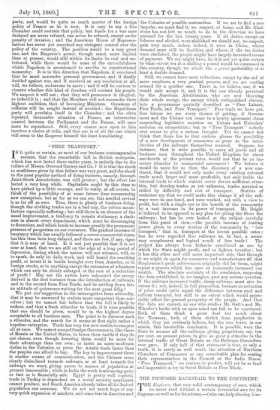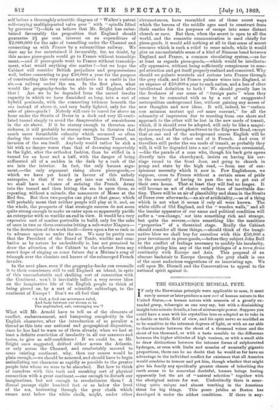THE PROPOSED BACKSTAIR TO THE CONTINENT.
TBE Engineer, that very solid contemporary of ours, which we never read without a certain reverential awe for its diagrams as well as for its science,—(who can help abasing him-
self before a thoroughly scientific diagram of "Walker's patent self-varying multipleported valve gear" with "spindle lifted by governor "?)—bids us believe that Mr. Bright has enter- tained favourably the proposition that England should guarantee 2i per cent. interest on an expenditure of £2,000,000 for the sake of tunnelling under the Channel and connecting us with France by a submaritime railway. We dare say he has entertained it favourably, for, no doubt, by this means piece-goods would go to France without transship- ment,—and if piece-goods went to France without transship- ment, what would anything else matter ?—but we hope the Cabinet will consider British prejudices and prepossessions well, before consenting to pay £50,000 a year for the purpose of constructing this very curious antithesis to a castle in the air,—a railway under the sea. In the first place, what would the geography-books be able to call England after that ? Are we to be degraded from the sacred insular capacity in which we have flourished so long, into a sort of hybrid peninsula, with the connecting isthmus beneath the sea instead of above it, and very badly lighted, only for the sake of piece-goods ? Nobody will care to travel for above an hour under the Straits of Dover in a dark and very ill-venti- lated tunnel simply to avoid the disag,reeables of sea-sickness in the air above. If it be stormy enough to threaten sea- sickness, it will probably be stormy enough to threaten that much more formidable calamity which occurred so often during the construction of the useless Thames Tunnel, an invasion of the sea itself. Anybody would rather be sick a bit with no danger worse than that of drowning respectably in the light, after the orthodox fashion, than be stifled in a tunnel for an hour and a half, with the danger of being suffocated all of a sudden in the dark by a rush of the sea into the interior. In fact, the only human argu- ment,—the only argument rising above piece-goods,- which we have yet heard in favour of this unholy enterprise, is that if we do get into war with France, we shall have a chance of enticing the French Army into the tunnel and then letting the sea in upon them, so repeating, without a miracle, the manceuvre of Moses at the Red Sea. But then two peoples can play at that game, which will probably mean that neither people will play at it, and, on the whole, the prospects of that strategic success do not seem quite strong enough to make us enter upon so apparently pacific an enterprise with so warlike an end in view. It would be a very expensive sort of marine portcullis to build, only for the sake of once in two or three centuries letting a salt-water Niagara— to the destruction of the work itself—down upon a foe so rash as to advance upon us under the sea. We may be pretty sure that the President of the Board of Trade, warlike and com- bative as by nature he undoubtedly is, has not promised to draw the attention of the Cabinet to the scheme from any secret hope of singing on some future day a Miriam's song of triumph over the chariots and horses of the submerged French invader.
In the next place, even if the geography-books can reconcile it to their consciences still to call England an island, in spite of this uncomfortable and skulking sort of connection with the Continent, won't it inevitably inflict a very severe blow on the imaginative life of the English people to think of being pieced on, by a sort of scientific subterfuge, to the continent of Europe ? Don't we all feel that
"A God, a God our severance ruled, And bade between our shores to be The unplumbed, salt, estranging sea"?
What will Mr. Arnold have to tell us of the elements of conflict, embarrassment, and hampering complexity in the English character, after the introduction of so peculiar a thread as this into our national and geographical disposition, since he has had to warn us of them already, when we had at least a definite conviction of insularity in all our manners and tastes, to give us self-confidence ? If we could be, as Mr. Bright once suggested, drifted either across the Atlantic, or only across the Channel, and comfortably moored to some existing continent, why, then our course would be plain enough,—we should be annexed, and should have to begin assimilating our character as rapidly as possible to the greater people into whom we were to be absorbed. But how to think of ourselves with this tacit and sneaking sort of physical connection with a great continent,—one enough to disturb our imaginations, but not enough to revolutionize them? A dismal passage eight hundred feet or so below the level of the sea, borrowing through the grey chalk which comes next below the white chalk, might, under other
circumstances, have resembled one of those secret ways which the barons of the middle ages used to construct from their castles for the purposes of escape into some distant church or cave. But then, when the secret is open to all the world, and the romantic communication is used chiefly for piece-goods, it would add nothing at all to that sense of secret resource which is such a relief to some minds, while it would give an uncomfortable sense of a kind of Siamese bond between England and France, a common circulating system,—so far at least as regards piece-goods,—which would be intellectu- ally oppressive, without being sufficiently conspicuous to com- pel attention and get itself properlyrealized and conceived. Why should we pulsate worsteds and cottons into France through the grey chalk, and let France pulsate wines into England, at an expense of £50,000 a year to each nation, and a loss of clear intellectual definition to both ? We should greatly lose in the freshness of our sense of "foreign parts" when they come to be connected with us by a sort of exaggerated metropolitan underground line, without gaining any access of new thoughts and new ideas. It will, indeed, be " coelum non animum mutant qui sub mare currant," for all the solemnity of impression due to receding from one shore and approach to the other will be lost in the new mode of transit, which, if it should ever be adopted, will only be like a magni- fied journey from Farringdon Street to the Edgware Road, except that at one end of the underground course English will be spoken, and at the other end of it French. And even if travellers still prefer the sea mode of transit, as probably they will, it will be degraded into a sorb of superfluous ceremonial, —like the parade of a man who, though his back gate opens directly into the churchyard, insiits on having his car- riage round to the front door, and going to church in pomp and state by the high road, — from one of con- spicuous necessity which it now is. Few Englishmen, we suppose, cross to France without a certain sense of pride in the necessity of having to pass the sea to get out of their own home. That at least they will feel no longer. It will become an act of choice rather than of inevitable des- tiny. There will be an air of plausibility and sham in the Straits of Dover ever afterwards,—an air of artificiality,—as of a thing which is not what it seems if only all were known. The white cliffs of Old England, and the "wooden walls," and all the insular apparatus of our name and political condition will suffer a sea-change,' not into something rich and strange, but quite the reverse,—into something like the maritime " properties " of a theatrical stage. Really the Cabinet should consider all these things,—should think of the imagi- native blow we shall buy for ourselves with this £50,000 a year investment in piece-goods,—before they subject John Bull to the conflict of feelings necessary to modify his insularity, without giving him any of the real privileges of a terra firma continuity with Europe and Asia. This proposal of an obscure backstair to Europe through the grey chalk is one of the most audacious suggestions of an innovating age. We call upon Mr. Disraeli and the Conservatives to appeal to the national spirit against it.































 Previous page
Previous page